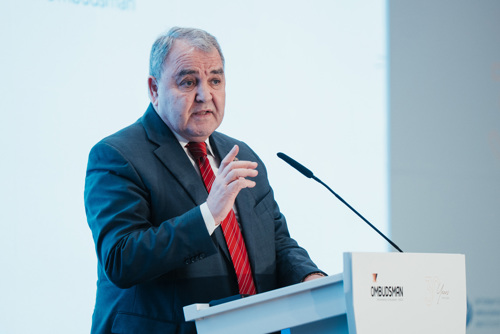
Speech by the Speaker of the House of Representatives, the Hon. Anglu Farrugia during the opening ceremony of the International Ombudsman Conference in Malta
Published October 15, 2025
Speech by the Speaker of the House of Representatives, the Hon. Anglu Farrugia during the opening ceremony of the International Ombudsman Conference in Malta
Published October 15, 2025

Excellencies,
Distinguished Ombudsmen and Commissioners,
Honourable Members of Parliament,
Representatives of international institutions,
Esteemed colleagues, ladies and gentlemen,
It is with profound honour and deep responsibility that I welcome you all this evening to the House of Representatives of Malta. This institution is not merely a chamber of law-making; it is the very symbol of our democracy, the seat of the people’s voice, and the custodian of the principles that hold our nation together.
Tonight, we open the doors of this House not only for parliamentary business but also to host an event of reflection and renewal — a welcome reception marking the 30th Anniversary of the Office of the Ombudsman, and the eve of the International Ombudsman Conference which begins tomorrow.
And as you move through this space tonight, you will encounter not words, but colours and forms — the voice of our young artists speaking through canvas. Their works transmit emotions that may not always be received as intended; yet that is the nature of truth when expressed freely. These exhibits are not mere decoration — they are interpretation. They remind us that the Ombudsman’s mission, like art itself, is to translate the unseen into the visible, to make heard what is often left unspoken. In these paintings, there is protest and peace, fragility and strength — echoes of the human condition that no report or judgment can fully capture.
Thirty years in the life of an institution may seem brief when measured against the span of history, but in democratic terms it is a lifetime of service. The Office of the Ombudsman has become a cornerstone of accountability, standing as an impartial guardian between the citizen and the State. At a time when global uncertainty, rapid technological change, and social pressures threaten to erode trust, the Ombudsman’s mission acquires new urgency. It is an institution that constantly reminds us that power must be exercised responsibly, decisions must be transparent, and governance must be rooted in fairness. This is the essence of upholding good governance in challenging times. It is not a slogan—it is a duty, one that requires courage, independence, and wisdom.
And I repeat what I said in another forum organised by the present Ombudsman: “An Ombudsman Office is not simply a listening post for complaints. It is, at its core, an institutional conscience — its loyalty owed not to noise, not to factions, not to shadows, but to the people and the truth.” These words remain as true tonight as they were then, because without that conscience, democracy loses its moral compass.
As Speaker of the House, I take great pride in welcoming you here in Malta. Our island nation may be small in size, but it has been at the crossroads of history for millennia. From this place, empires passed, cultures mingled, and ideas travelled. Today, we carry forward that legacy not with arms or conquests, but through dialogue, cooperation, and mutual respect. Malta has always sought to be a bridge — a bridge between North and South, between East and West, and between different cultures and traditions. This conference continues that tradition by bringing together Ombudsmen and human rights defenders from across the globe to share experience and wisdom.
In this House, we know well that democracy is fragile. It requires constant renewal. It is not enough to proclaim values; they must be lived daily through our institutions. The Ombudsman plays a vital role in ensuring that no citizen stands powerless before authority. Where there is injustice, the Ombudsman offers remedy. Where there is opacity, the Ombudsman brings transparency. Where there is abuse of power, the Ombudsman provides a check. But let us be clear: this responsibility is not the Ombudsman’s alone.
Parliament, government, judiciary, media, civil society — we are all called to uphold the principles of good governance, especially in moments when the temptation to abandon them is greatest.
As we embark on this commemoration, I would like us to ask ourselves: what will be the legacy of the next thirty years? Will future generations look back and see that we defended integrity, protected the vulnerable, and honoured the rule of law? The answer depends on what we do now — how we strengthen institutions, how we confront corruption, how we embrace new challenges such as digitalisation and artificial intelligence, without ever abandoning our human-centred values.
Excellencies, distinguished guests, tonight’s gathering is therefore more than a celebration; it is a prelude — a moment to pause, to reflect, and to prepare for the discussions that begin tomorrow. Let this evening remind us that the spirit of dialogue must always be matched by the courage to act.
And before I conclude, allow me to express a word of sincere admiration and gratitude to the young artists of the Art for Rights exhibition. Through their imagination and courage, they have given life to the very ideals we speak of tonight. Their paintings do not merely adorn these halls — they give them voice. They remind us that the defence of rights is not confined to statutes or chambers, but also to brushstrokes, colours, and conscience. May their example inspire us to continue shaping justice not only through words, but through vision, compassion, and truth.
I thank you for your presence, for your commitment, and for the example you give by being here. I wish you a pleasant evening and a fruitful conference beginning tomorrow.
Thank you.
Please Wait
Processing
Operation Completed